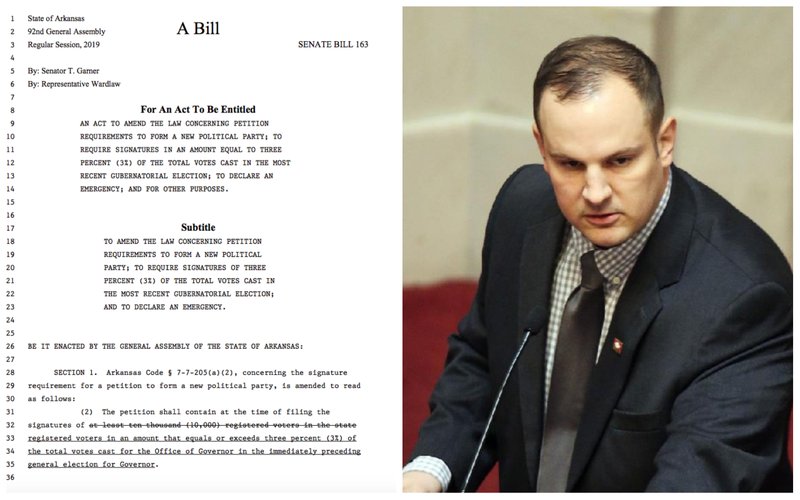A bill that would make it more difficult for minor political parties to get on the ballot zipped through a state Senate committee in about 2½ minutes Tuesday.
With Sen. Will Bond, D-Little Rock, dissenting in a voice vote, the eight-member Senate State Agencies and Governmental Affairs Committee recommended Senate approval of Senate Bill 163 by Sen. Trent Garner, R-El Dorado.
After the bill cleared the committee, the chairman of the state Libertarian Party warned the committee that the legislation is unconstitutional. Garner disagreed with that.
State law requires minor political parties to petition to get on the ballot. They must turn in 10,000 valid signatures of registered voters to the secretary of state's office. The petitions must be turned in at least 60 days ahead of the filing period.
[RELATED: Complete Democrat-Gazette coverage of the Arkansas Legislature]
SB163 would increase that threshold to 3 percent of total votes cast in the previous gubernatorial election. That would be about 26,745 signatures based on the turnout in the 2018 general election, Garner told the Senate committee.
He said SB163 "would remove the artificially created low threshold of 10,000 signatures and instead return it to the true representation of our population of Arkansas.
"This is what the requirement we had from 1977 until 2006 [was] and, by the way, this is only dealing with political parties and not candidates," Garner said.
The 10,000-signatures threshold is "representative of the voting population before the 1950s," he said. "Right now, our population is growing, just over 3 million. Roughly 850,000 people vote every election, give or take what year it is."
Because the party files petitions, Libertarian Party candidates have been able to get on ballots in each of the past four election cycles.
According to Arkansas Code Annotated 7-7-205, a "new" party is one that hasn't achieved party status. To achieve that status, a party's nominee must receive at least 3 percent of the vote on the gubernatorial or presidential ticket.
The Libertarian Party's 2018 nominee for governor, Mark West of Batesville, earned 2.9 percent of the vote, or 861 votes short of ensuring that his party would have ballot access in 2020.
By lacking party status, Libertarians must gather signatures every two years. No other minor party has gained a spot on the ballot for state races since 2014, when the Green Party ran a slate of candidates.
The chairman of Libertarian Party, Michael Pakko of Little Rock, showed up to testify against the bill, after the Senate committee endorsed the legislation, so committee Chairman Sen. Ron Caldwell, R-Wynne, allowed Pakko to testify against the bill.
Pakko said SB163 would increase the signature requirement for third parties from 10,000 to effectively about 27,000 and "would make it more difficult for third parties like Libertarians to qualify candidates for the ballot.
"As such, it would be a clear effort to suppress competition in the political process," he said. "The fact that it includes an emergency clause makes it even more evident this is intended to stifle competition in the 2020 election to the benefit of incumbent politicians and their entrenched political parties.
"More importantly, I think this is the kicker, SB163 is blatantly unconstitutional," Pakko said.
The bill violates the clear meaning of a federal court ruling in the Green Party versus then-Democratic Secretary of State Charlie Daniels case in 2006 that prompted the 2007 Legislature to adopt the 10,000 signature rule to replace the 3 percent requirement, he said.
In 2006, U.S. District George Howard Jr. ruled that the state law requiring new parties, such as the Green Party, to obtain signatures equal to 3 percent of the number of votes cast in the previous gubernatorial election was unconstitutional because it set a higher standard for third parties than independents. That cleared the way for the Green Party to place nominees on the ballot in 2006 for statewide races.
"The notion that the ballot is overcrowded, there isn't even space for serious candidates, is absurd," Pakko said Tuesday, noting that more than half of legislative seats up for election in 2018 were unopposed.
Afterward, Garner said his bill "is not unconstitutional.
"There is an artificially created threshold of 10,000 votes. I believe it will pass constitutional muster. It will assure more secure ballots, make sure that we have good ballots and reflect the population much better," he said.
Metro on 01/30/2019

